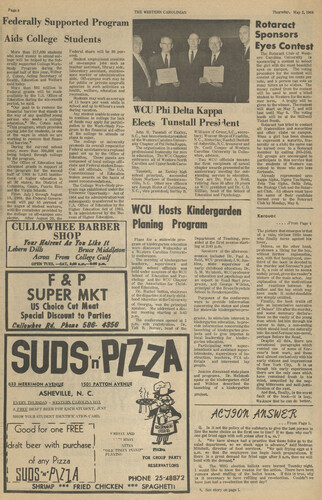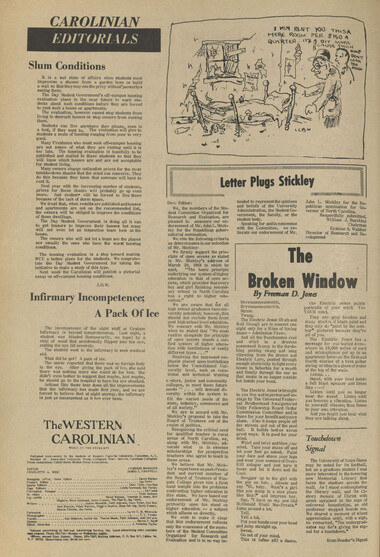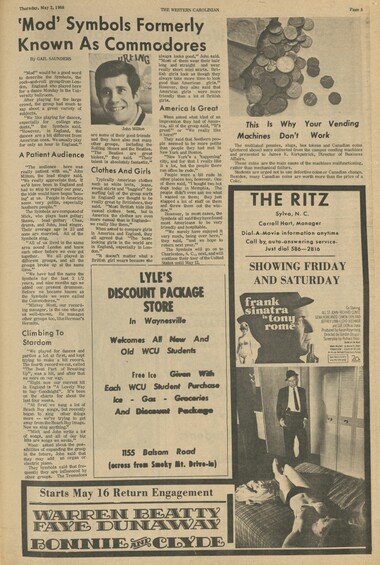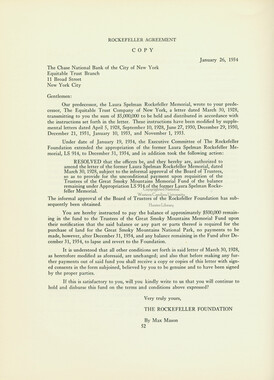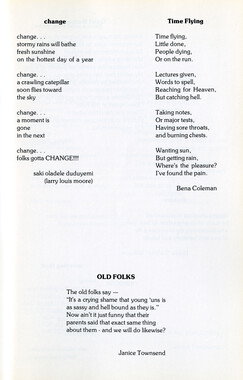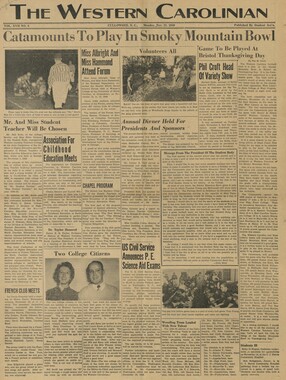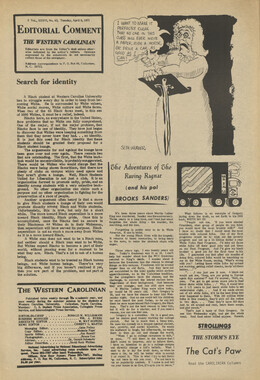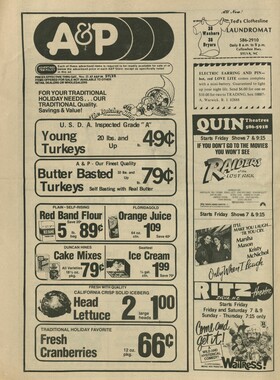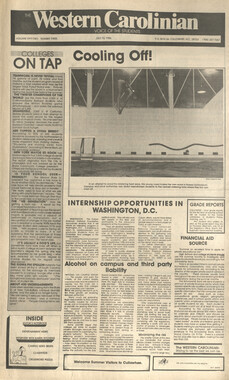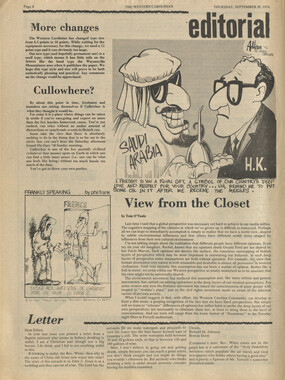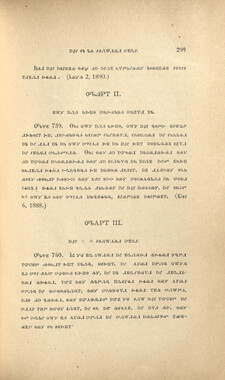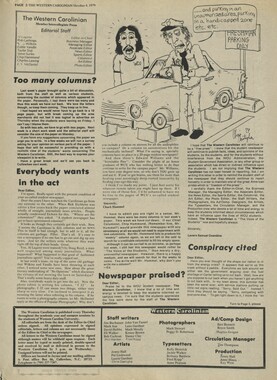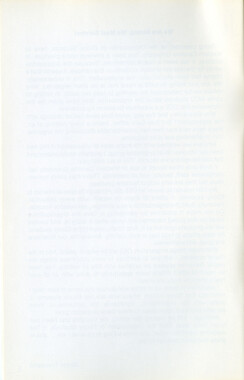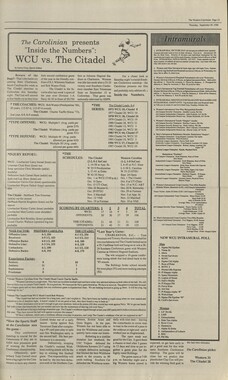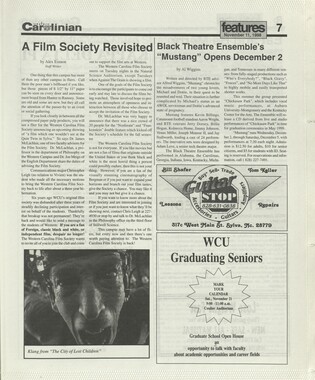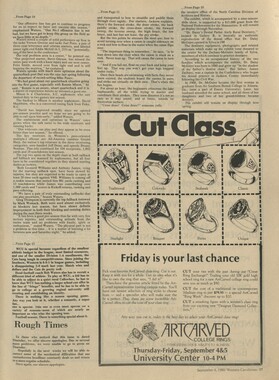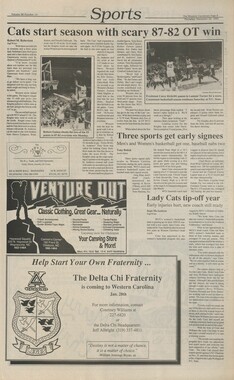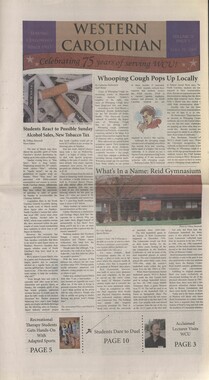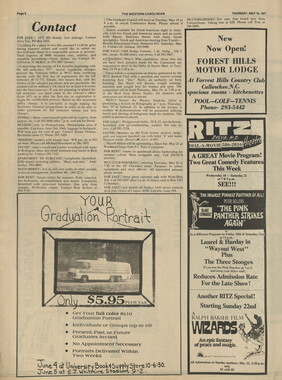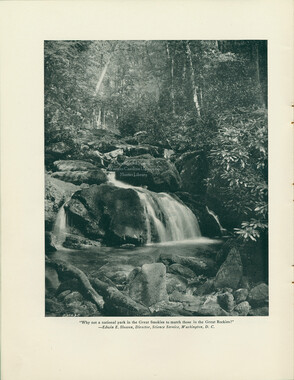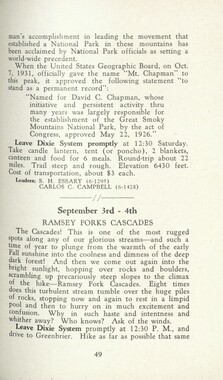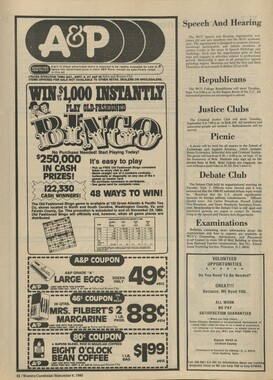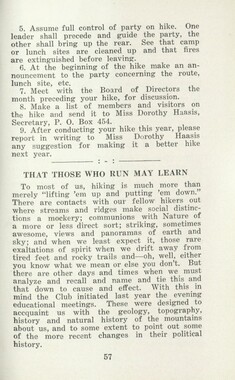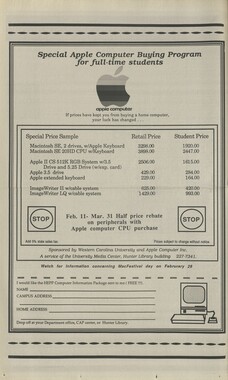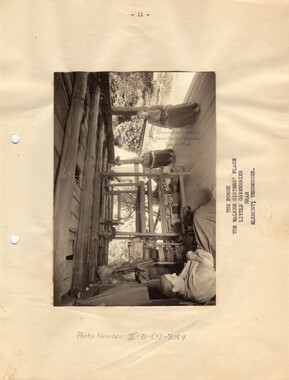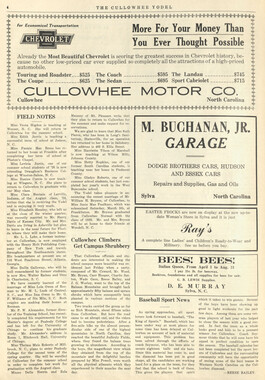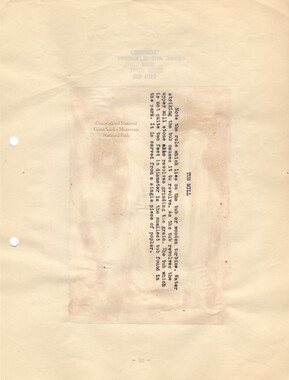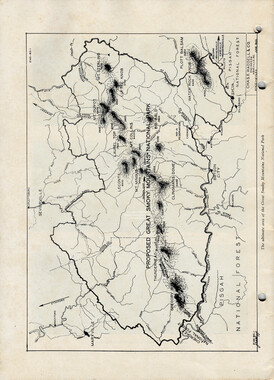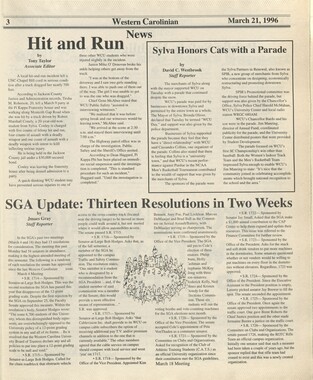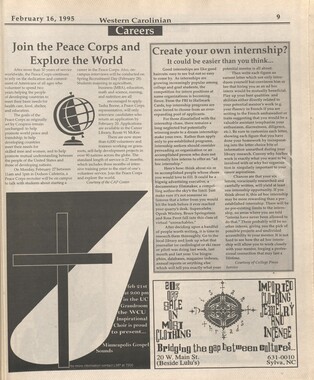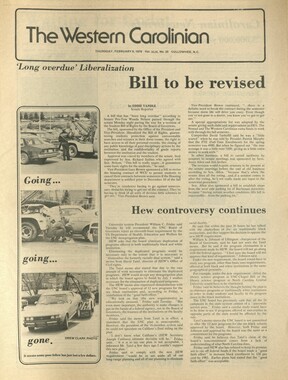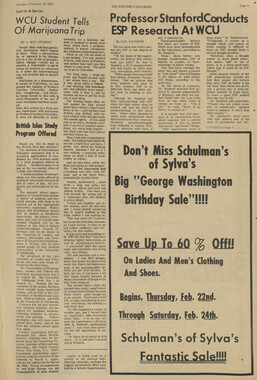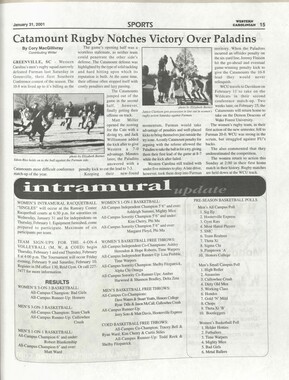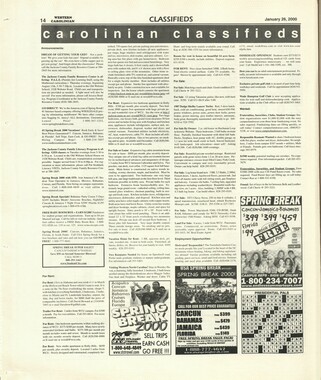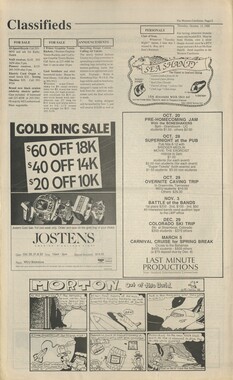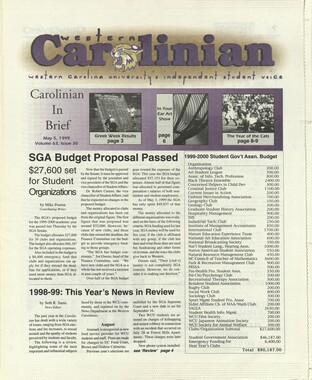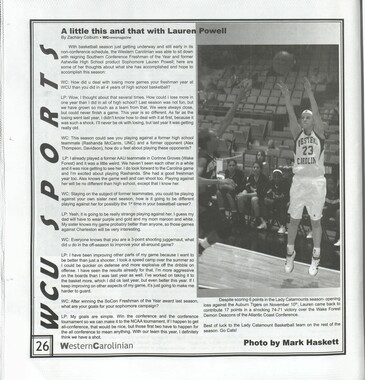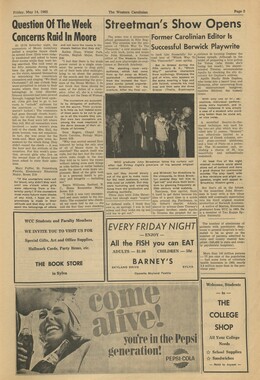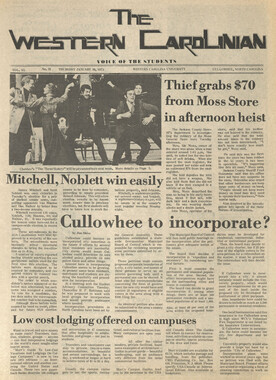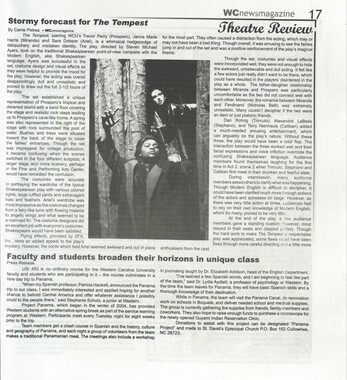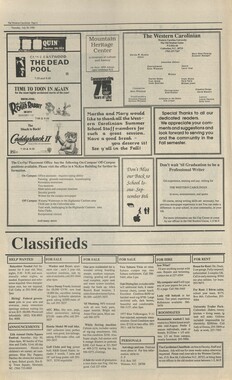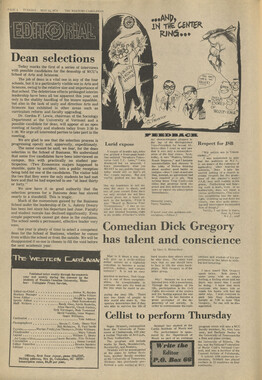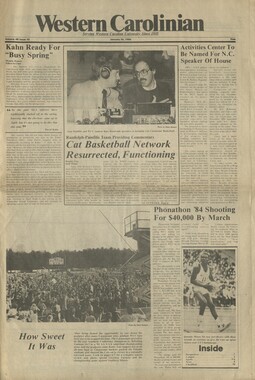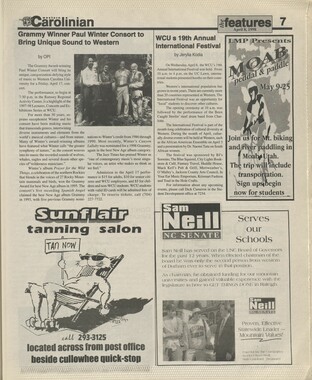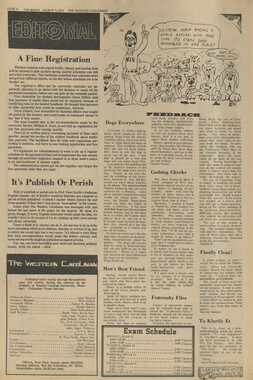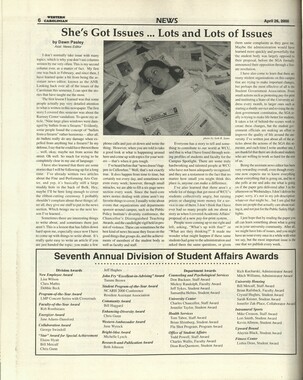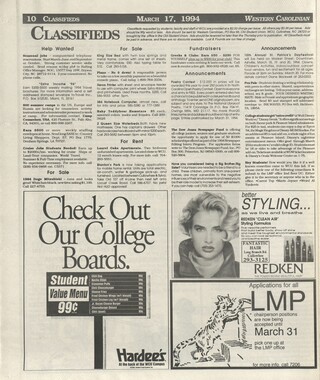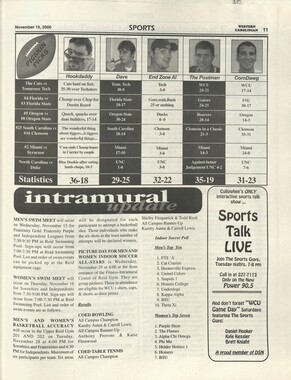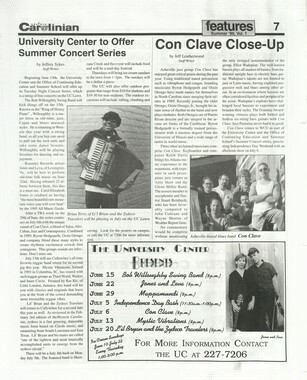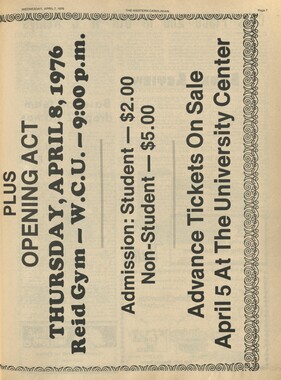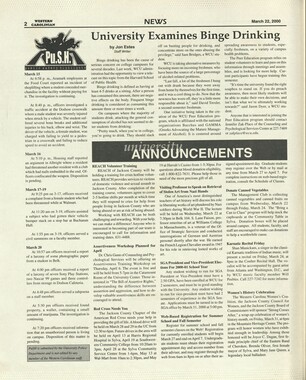Western Carolina University (20)
View all
- Canton Champion Fibre Company (2308)
- Cherokee Traditions (291)
- Civil War in Southern Appalachia (165)
- Craft Revival (1942)
- Great Smoky Mountains - A Park for America (2946)
- Highlights from Western Carolina University (430)
- Horace Kephart (941)
- Journeys Through Jackson (159)
- LGBTQIA+ Archive of Jackson County (85)
- Oral Histories of Western North Carolina (314)
- Picturing Appalachia (6873)
- Stories of Mountain Folk (413)
- Travel Western North Carolina (160)
- Western Carolina University Fine Art Museum Vitreograph Collection (129)
- Western Carolina University Herbarium (92)
- Western Carolina University: Making Memories (738)
- Western Carolina University Publications (2491)
- Western Carolina University Restricted Electronic Theses and Dissertations (146)
- Western North Carolina Regional Maps (71)
- World War II in Southern Appalachia (131)
University of North Carolina Asheville (6)
View all
- Allanstand Cottage Industries (62)
- Appalachian National Park Association (53)
- Bennett, Kelly, 1890-1974 (1463)
- Berry, Walter (76)
- Brasstown Carvers (40)
- Carver, George Washington, 1864?-1943 (26)
- Cathey, Joseph, 1803-1874 (1)
- Champion Fibre Company (233)
- Champion Paper and Fibre Company (297)
- Cherokee Indian Fair Association (16)
- Cherokee Language Program (22)
- Crowe, Amanda (40)
- Edmonston, Thomas Benton, 1842-1907 (7)
- Ensley, A. L. (Abraham Lincoln), 1865-1948 (275)
- Fromer, Irving Rhodes, 1913-1994 (70)
- George Butz (BFS 1907) (46)
- Goodrich, Frances Louisa (120)
- Grant, George Alexander, 1891-1964 (96)
- Heard, Marian Gladys (60)
- Kephart, Calvin, 1883-1969 (15)
- Kephart, Horace, 1862-1931 (313)
- Kephart, Laura, 1862-1954 (39)
- Laney, Gideon Thomas, 1889-1976 (439)
- Masa, George, 1881-1933 (61)
- McElhinney, William Julian, 1896-1953 (44)
- Niggli, Josephina, 1910-1983 (10)
- North Carolina Park Commission (105)
- Osborne, Kezia Stradley (9)
- Owens, Samuel Robert, 1918-1995 (11)
- Penland Weavers and Potters (36)
- Roberts, Vivienne (15)
- Roth, Albert, 1890-1974 (142)
- Schenck, Carl Alwin, 1868-1955 (1)
- Sherrill's Photography Studio (2565)
- Southern Highland Handicraft Guild (127)
- Southern Highlanders, Inc. (71)
- Stalcup, Jesse Bryson (46)
- Stearns, I. K. (213)
- Thompson, James Edward, 1880-1976 (226)
- United States. Indian Arts and Crafts Board (130)
- USFS (683)
- Vance, Zebulon Baird, 1830-1894 (1)
- Weaver, Zebulon, 1872-1948 (58)
- Western Carolina College (230)
- Western Carolina Teachers College (282)
- Western Carolina University (2008)
- Western Carolina University. Mountain Heritage Center (18)
- Whitman, Walt, 1819-1892 (10)
- Wilburn, Hiram Coleman, 1880-1967 (73)
- Williams, Isadora (3)
- Cain, Doreyl Ammons (0)
- Crittenden, Lorraine (0)
- Rhodes, Judy (0)
- Smith, Edward Clark (0)
- Appalachian Region, Southern (2569)
- Asheville (N.C.) (1923)
- Avery County (N.C.) (26)
- Blount County (Tenn.) (195)
- Buncombe County (N.C.) (1672)
- Cherokee County (N.C.) (283)
- Clay County (N.C.) (555)
- Graham County (N.C.) (236)
- Great Smoky Mountains National Park (N.C. and Tenn.) (519)
- Haywood County (N.C.) (3569)
- Henderson County (N.C.) (70)
- Jackson County (N.C.) (4912)
- Knox County (Tenn.) (35)
- Knoxville (Tenn.) (13)
- Lake Santeetlah (N.C.) (10)
- Macon County (N.C.) (420)
- Madison County (N.C.) (215)
- McDowell County (N.C.) (39)
- Mitchell County (N.C.) (132)
- Polk County (N.C.) (35)
- Qualla Boundary (982)
- Rutherford County (N.C.) (76)
- Swain County (N.C.) (2182)
- Transylvania County (N.C.) (270)
- Watauga County (N.C.) (12)
- Waynesville (N.C.) (86)
- Yancey County (N.C.) (72)
- Aerial Photographs (3)
- Aerial Views (60)
- Albums (books) (4)
- Articles (1)
- Artifacts (object Genre) (228)
- Bibliographies (1)
- Biography (general Genre) (2)
- Cards (information Artifacts) (38)
- Clippings (information Artifacts) (191)
- Copybooks (instructional Materials) (3)
- Crafts (art Genres) (622)
- Depictions (visual Works) (21)
- Design Drawings (1)
- Drawings (visual Works) (185)
- Envelopes (73)
- Exhibitions (events) (1)
- Facsimiles (reproductions) (1)
- Fiction (general Genre) (4)
- Financial Records (12)
- Fliers (printed Matter) (67)
- Glass Plate Negatives (381)
- Guidebooks (2)
- Internegatives (10)
- Interviews (815)
- Land Surveys (102)
- Letters (correspondence) (1013)
- Manuscripts (documents) (618)
- Maps (documents) (177)
- Memorandums (25)
- Minutes (administrative Records) (59)
- Negatives (photographs) (6090)
- Newsletters (1290)
- Newspapers (2)
- Notebooks (8)
- Occupation Currency (1)
- Paintings (visual Works) (1)
- Pen And Ink Drawings (1)
- Periodicals (193)
- Personal Narratives (10)
- Photographs (12976)
- Plans (maps) (1)
- Poetry (5)
- Portraits (4568)
- Postcards (329)
- Programs (documents) (181)
- Publications (documents) (2443)
- Questionnaires (65)
- Relief Prints (26)
- Sayings (literary Genre) (1)
- Scrapbooks (282)
- Sheet Music (2)
- Slides (photographs) (402)
- Songs (musical Compositions) (2)
- Sound Recordings (796)
- Specimens (92)
- Speeches (documents) (18)
- Tintypes (photographs) (8)
- Transcripts (322)
- Video Recordings (physical Artifacts) (23)
- Text Messages (0)
- A.L. Ensley Collection (275)
- Appalachian Industrial School Records (7)
- Appalachian National Park Association Records (336)
- Axley-Meroney Collection (2)
- Bayard Wootten Photograph Collection (20)
- Bethel Rural Community Organization Collection (7)
- Blumer Collection (5)
- C.W. Slagle Collection (20)
- Canton Area Historical Museum (2110)
- Carlos C. Campbell Collection (462)
- Cataloochee History Project (64)
- Cherokee Studies Collection (4)
- Daisy Dame Photograph Album (5)
- Daniel Boone VI Collection (1)
- Doris Ulmann Photograph Collection (112)
- Elizabeth H. Lasley Collection (1)
- Elizabeth Woolworth Szold Fleharty Collection (4)
- Frank Fry Collection (95)
- George Masa Collection (173)
- Gideon Laney Collection (452)
- Hazel Scarborough Collection (2)
- Hiram C. Wilburn Papers (28)
- Historic Photographs Collection (236)
- Horace Kephart Collection (861)
- Humbard Collection (33)
- Hunter and Weaver Families Collection (1)
- I. D. Blumenthal Collection (4)
- Isadora Williams Collection (4)
- Jesse Bryson Stalcup Collection (47)
- Jim Thompson Collection (224)
- John B. Battle Collection (7)
- John C. Campbell Folk School Records (80)
- John Parris Collection (6)
- Judaculla Rock project (2)
- Kelly Bennett Collection (1482)
- Love Family Papers (11)
- Major Wiley Parris Civil War Letters (3)
- Map Collection (12)
- McFee-Misemer Civil War Letters (34)
- Mountain Heritage Center Collection (4)
- Norburn - Robertson - Thomson Families Collection (44)
- Pauline Hood Collection (7)
- Pre-Guild Collection (2)
- Qualla Arts and Crafts Mutual Collection (12)
- R.A. Romanes Collection (681)
- Rosser H. Taylor Collection (1)
- Samuel Robert Owens Collection (94)
- Sara Madison Collection (144)
- Sherrill Studio Photo Collection (2558)
- Smoky Mountains Hiking Club Collection (616)
- Stories of Mountain Folk - Radio Programs (374)
- The Reporter, Western Carolina University (510)
- Venoy and Elizabeth Reed Collection (16)
- WCU Gender and Sexuality Oral History Project (32)
- WCU Mountain Heritage Center Oral Histories (25)
- WCU Oral History Collection - Mountain People, Mountain Lives (71)
- WCU Students Newspapers Collection (1923)
- Western North Carolina Tomorrow Black Oral History Project (69)
- William Williams Stringfield Collection (2)
- Zebulon Weaver Collection (109)
- African Americans (390)
- Appalachian Trail (35)
- Artisans (521)
- Cherokee art (84)
- Cherokee artists -- North Carolina (10)
- Cherokee language (21)
- Cherokee pottery (101)
- Cherokee women (208)
- Church buildings (189)
- Civilian Conservation Corps (U.S.) (111)
- College student newspapers and periodicals (2012)
- Dams (107)
- Dance (1023)
- Education (222)
- Floods (61)
- Folk music (1015)
- Forced removal, 1813-1903 (2)
- Forest conservation (220)
- Forests and forestry (1184)
- Gender nonconformity (4)
- Great Smoky Mountains National Park (N.C. and Tenn.) (181)
- Hunting (45)
- Landscape photography (25)
- Logging (119)
- Maps (83)
- Mines and mineral resources (8)
- North Carolina -- Maps (18)
- Paper industry (38)
- Postcards (255)
- Pottery (135)
- Railroad trains (72)
- Rural electrification -- North Carolina, Western (3)
- School integration -- Southern States (2)
- Segregation -- North Carolina, Western (5)
- Slavery (5)
- Sports (452)
- Storytelling (243)
- Waterfalls -- Great Smoky Mountains (N.C. and Tenn.) (66)
- Weaving -- Appalachian Region, Southern (280)
- Wood-carving -- Appalachian Region, Southern (328)
- World War, 1939-1945 (173)
Western Carolinian Volume 33 Number 46
Item
Item’s are ‘child’ level descriptions to ‘parent’ objects, (e.g. one page of a whole book).
-
-
Page 8 THE WESTERN CAROLINIAN Federally Supported Program Aids College Students More than 217,000 students who need money to attend college will be helped by the federally supported College Work- Study Program during the second half of this year, Wilbur J. Cohen, Acting Secretary of Health, Education and Welfare said today. More than $82 million in Federal grants will be made available by the U.S. Office of Education during the six-month period, he said. "Our goal is to remove the financial barrier that stands in the way of any qualified young person who seeks a college education," Mr. Cohen said. "This program, which provides paying jobs for students, is one of the ways in which we are working to remove that financial barrier." During the current school year, more than 300,000 are being helped through college by the program. The Office of Education has allocated grants in support of the program for the second half of 1968 to 1,845 institutions of higher education in all 50 states, the District of Columbia, Guam, Puerto Rico and the Virgin Islands. From July 1 through August 19, 1968, the Federal Govern- ment will pay 85 percent of the wages of student workers, with the remainder provided by the college or off-campus em- ployer. After August 20, the Federal share will be 80 percent Student employment consists of on-campus jobs such as teacher assistant, library aide, laboratory assistant, maintenance worker or administrative aide. Off-campus work may be for public or private nonprofit agencies in such activities as health, welfare, education and recreation. Students may work an average of 15 hours per week while in school and up to 40 hours a week during vacation. Any student unable to enter or to continue in college for lack of funds may apply for participation in the Work-Study Program to the financial aid office of the college he attends or plans to enter. The college or university presents its overall request for Federal assistance toaregional panel set up by the Office of Education. These panels are composed of local college officials and Federal student financial aid officials. The U.S. Commissioner of Education makes awards on the basis of panel recommendations. The College Work-Study program was established under the Economic Opportunity r Act of 1964 and its administration was subsequently transferred to the U.S. Office of Education by the Higher Education Act of 1965. It is administered by the Bureau of Higher Education. CULLOWHEE BARBER SHOP Your Huireut At You Like It Lebern Dills Bruce Middleton Across From College Gulf OPEN TUES. —SAX. i'M aunv—6H» pua. F&P SUPER MKT US Choice Cut Meat Special Discount to Parties Cullowhee Pi. Phoue 5M- 4SS$ WCU Phi Delta Kappa Elects Tunstall PresHent John H. Tunstall of Easley, S.C, has been elected president of the Western Carolina University Chapter of Phi Delta Kappa. The organization is a national professional fraternity for men in education. The W'JU Chapter embraces all of Western North Carolina and Upper South Carolina, Tunstall, an Easley high school principal, succeeded Glenn Marlowe of Henderson- ville, N.C< Other new officers are Joseph Hicks of Cullowhee, NX., vice president; Smiley B, Williams of Greer,S.C,secretary; Weaver Shope of Franklin, N C., historian; Randall Dickett of Asheville, N.C. treasurer and Dr. Cecil Cosper of Western Carolina University in Cullowhee, advisor. Two WCU officials became the first recipients of annual chapter awards presented at the anniversary meeting for outstanding service to education. They are Dr. Paul A. Reid, retiring June 30 after 19 years as WCU president and Dr. CD. Killian, head of the School of Education and Psychology. WCU Hosts Kindergarten Planing Program Plans for a statewide program of kindergarten education were discussed Wednesday at a Western Carolina University conference. The meeting of kindergarten teachers, supervisors and public school officials was held under auspices of the WCU School of Education and Psychology and the WCU Chapter of the Association for Childhood Education. Dr. Rachel Sutton, chairman of the department of early childhood education at the University of Georgia, was the principal speaker. She addressed a dinner meeting starting at 5:45 p.m. The conference opened at 2 p.m. with registration. Dr. Taft B. Botner, head of the SUDS-fftrt 633 MERRIMON AVENUE ASHEVILLE, N. C. EVERY THURSDAY - WESTERN CAROLINA DAY A FREE DRAFT BEER FOR EACH STUDENT, .11 ST SHOW YOUR STUDENT IDENTIFICATION-CAKD. rGood for one FREE n ! draft beer with purchase, of any Pizza FRIDAY AND '""THDAY MTES "OLETIMEY PIANO" PLAYING EHOht TOR GROUP PARTY RESERVATIONS L PHONE 25-48872 SHRIMP *** FR ED CHICKEN *** SPAGHETTI Department of Teaching, presided at toe first session starting at 2:45 p.m. Speakers at the afternoon - session included Dr. Paul A. Reid, WCU president; J.W. Jenkins, state supervisor of early childhood education; Dr. S. M„ Mcintosh, WCU professor of education and psychology and an expert in Head Start programs, and George Wilkins, principal of the Bruce Drysdale School in Hendersonville. Purposes of the conference were to provide information concerning the status and plans for statewide kindergarten programs, to stimulate interest in kindergarten education, to provide information concerningthe launching of kindergarten projects and to give impetus to local leadership for kindergarten education. Participating were superintendents and assistant superintendents, supervisors of instruction, teachers, PTA officials and interested lay people. Jenkins discussed state plans and programs. Dr. Mcintosh spoke on the kindergarten child and Wilkins described the launching of a kindergarten project. Thursday, May 2,1968 Rotaract Sponsors Eyes Contest The Rotaract Club of Western Carolina University is sponsoring a contest to select the girl with the most beautiful eyes on campus. The voting procedure for the contest will consist of paying ten cents per vote, and a person can vote as many times as he wishes. The money raised from the contest will be used to send a blind student to Western for the summer term. A trophy will be given to the winner. The contest will start on May 7, and will last until May 9. The voting booth will be at the Stillwell Ticket Booth. Rotaract has tried to contact all fraternities and sororities and other clubs on campus. When a girl has been chosen to represent a sorority, fraternity or a club; the name can be turned over to a Rotaract member by calling 293-2541. All groups are encouraged to participate in this service that the students of Western can extend to those who are less fortunate. Already represented are: kappa Alpha, Sigma Tau Sigma, Zeta Tau Alpha, Delta Zeta, the Biology Club and the Rotaract Club. All others must have the name of their candidate turned over to the Rotoract Club by Monday, May 6. Kerouac •From Page 4 The picture that emerges is that of a vain, vicious little tease who finally turns against his lover. Duluoz, on the other hand, professes a liking for the boy, without further explanation, and, with that background, one- third of the book is devoted to the murder and Kerouac's part in it, a role of which he seems unduly proud, given the reader's picture of the main actor. Any explanation of the motivations and reactions between the author and the boy which may have made it understandable are simply omitted. Finally, the book trails off into an inconclusive narrative of Duluoz* life after the murder, and some summary declarations on the vanity of the young man which led him through his career to date, a non-ending which should lead one naturally into the next Kerouac non-novel, perhaps Before the Road. Despite all this, there are occasional paragraphs which remind one of some of Kerouac's best work, and these deal almost exclusively with his early visions and impressions of New York City. It is as though his early experiences there are the only ones which have remained fresh in his mind, unspoiled by the nagging bitterness and self-justification of the rest And that, finally, is the worst fault of the book—it is lazy. WeJtnow that he can do better. md0% rWSWSTt . . . From Page 1. Q. Is it not the policy of the cafeteria to give the last person in line the same choice as the first one in line? If so them why can't one get fried eggs with soft yokes after 8 a.m.? A. "We have always had a practice that these folks go to the salad department, so we stack eggs in advance," said Stedman Mitchell, director of food services. "We quit frying eggs at 8 a.m. so that the employees can begin lunch preparations. If there is a great demand for fried eggs after 8 a.m. then we will bend with the demand." Q. The WHG election ballots were burned Tuesday night. I would like to know the reason for the action. There have been rumors about stuffing of the ballot boxes. If this is true, why is it necessary to have refiling and re-election. Couldn't we have just had a re-election the next day? \. See story on page 1.
Object
Object’s are ‘parent’ level descriptions to ‘children’ items, (e.g. a book with pages).
-
The Western Carolinian is Western Carolina University’s student-run newspaper. The paper was published as the Cullowhee Yodel from 1924 to 1931 before changing its name to The Western Carolinian in 1933.
-

